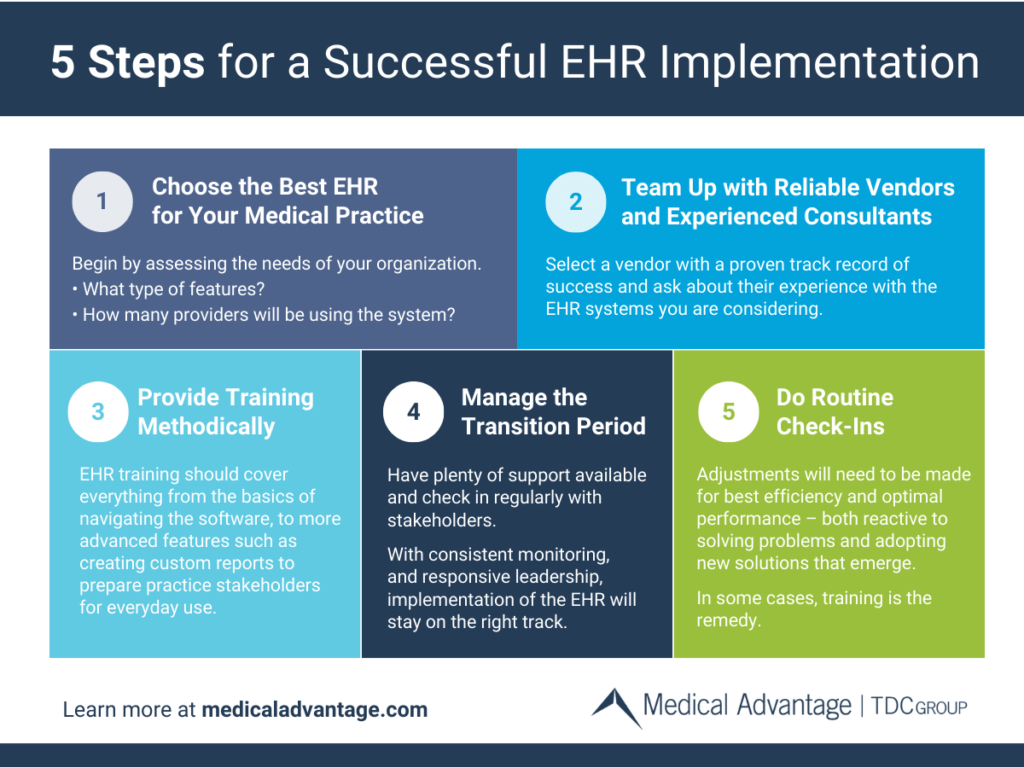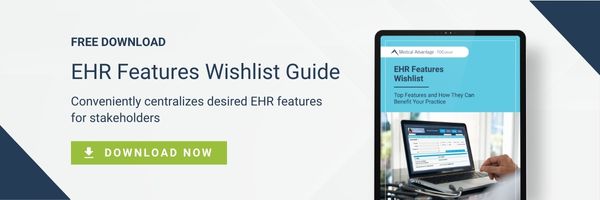EHR implementation is the careful and intricate process of rolling out and integrating a new electronic health records (EHR) system. Implementation strategy works to ensure that everything is connected properly and running smoothly, but it is also about affirming that all stakeholders will be able to successfully use the system.
Implementing an EHR is a complicated process that also must be done correctly to avoid trouble down the line that can sometimes be costly.
To help guide the process of developing the best strategy for your organization, here are six steps to help ensure a successful implementation.
1.) Choose the Best EHR for Your Medical Practice
The first of our five EHR implementation steps starts with choosing the right electronic health records system. But with so many different electronic health records systems on the market, how can you ascertain which one is right for your practice?
To narrow down the vast selection, you begin by assessing the needs of your organization. How many providers will be using the system? What type of features do you need?
Once you have a good understanding of your needs, you can start looking at different EHR systems and comparing features. Some systems are more user-friendly than others, some have more robust features, and some are more affordable.
Next, take your short list of potential EHRs to your team(s). Team inclusion in the decision process is the most important part of your EHR system selection. Listening to the feedback, experience, and preferences of those who will use the EHR is the most instrumental in the long-term success of its utilization.
2.) Team Up with Reliable Vendors and Experienced Consultants
Working with a trusted vendor will help ensure that your new system is properly installed and configured to get the most out of your EHR. Select one with a proven track record of success by asking for references from other businesses and checking online reviews from current clients. Also, be sure to ask about their experience with the EHR systems you are considering.
EHR consultants, on the other hand, can provide support tailored to the needs of your medical practice for selection, implementation, data migration, and thereafter (such as EHR optimization). This can be especially valuable when you need to effectively train and encourage buy-in among your team members. Another benefit of working with a consultant is that they can work with vendors on your behalf to resolve special-case issues.
3.) Provide Training Methodically
Successfully implementing an EHR depends on comprehensive training on how to best use the system according to each role on the team. EHRs can be complex and challenging to use, but with effective training, practice stakeholders are prepared to successfully use the system day-to-day.
EHR training should cover everything from the basics of navigating the software, to more advanced features such as creating custom reports. By ensuring that your staff can use the EHR to its fullest, you can help make the transition to a new EHR system a smooth and successful one. Below are expert tips on what to include in your EHR training success plan.
- Select a physician champion and form a dedicated training committee of leaders across your organization
- Collect feedback from all internal stakeholders who work with your EHR to develop an EHR implementation plan
- Assess the skill levels of everyone involved so you can provide training suited to all levels and roles
- Personalize the training process so each person only learns the functions specific to their role
- Delegate an EHR super user who sees the big picture, can champion training and troubleshoot for the team
- Create a roadmap to train everyone in phases
- Leverage management input to minimize disruption to regular operations
- Establish standard training and resources across the organization
- Gather feedback throughout the process to address frustrations and ensure everyone is properly trained
- Provide training in the EHR environment to ensure everyone comprehends workflows and best practices
- If needed, gather insights from external resources to see what they have done to resolve common EHR implementation and training issues
The goal of EHR training is to help each team member use the EHR effectively and efficiently, and this process requires patience, structure, coordination, and adaptability.
4.) Steer and Manage the Transition Period
Successfully implementing an EHR system takes time and patience. During this process, it helps to have plenty of support available and to check in with stakeholders by asking them if they have any questions or concerns. With consistent monitoring, and responsive leadership, implementation of the EHR will stay on the right track.
5.) Do Routine Check-Ins Post-Implementation
While there is a tendency to treat EHRs as a “set it and forget it” fixture in medical practice operations, this is how problems sneak in and interfere with electronic health records efficacy. Rather, adjustments will need to be made for best efficiency and optimal performance – both reactive to solving problems and adopting new solutions that emerge in the future. In some cases, additional training is the appropriate remedy.
For example, a practice manager can look at the overall workflow of the office. Have there been any major changes since the EHR system was implemented? If so, how have those changes affected productivity?
Are staff members able to find the information they need quickly and easily? Are patients satisfied with patient portal use? Gathering feedback and monitoring performance helps uncover improvement opportunities.
Some adjustments your team may be able to figure out on their own, but other fixes you may not be confident about or question what the best approach is. As you would during the implementation process, you can lean on the support of vendors and EHR consultants to find solutions to emerging issues throughout the lifespan of the EHR. Utilizing these outside resources can help resolve issues sooner and more effectively.

Get the Most Value from Your EHR with Expert Consultants at Your Side
EHRs are a common source of frustration for many healthcare organizations, so if you find yourself perplexed by why your system causes more problems than it solves, you are not alone. EHRs out-of-the-box are generally not prepped to integrate with your workflows and tools already in place.
EHR consultants at Medical Advantage work elbow-to-elbow with your practice to find the best solutions to EHR problems and inefficiencies, including remedial training for your super users and staff.
After helping hundreds of medical practices achieve success through EHR optimization, our consultants have the wisdom to confidently recommend effective solutions for long-term success. To learn more about how to make an EHR work for you and not against you, get in touch through our contact form.






